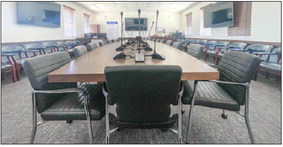Board discusses farm rules; adding cameras to gates


GRF BOARD HIGHLIGHTS
by Ruth Osborn
Communications Director
The GRF Board met Feb. 27 to work through a fairly light agenda that included no capital funding items in an effort to hold the line on spending in an inflationary year that will likely see significant increases in property insurance and city water rates, among other hikes.
“The board is practicing strict discipline in regard to spending, no capital items were funded this month,” GRF President Marsha Gerber told the assembled audience.
The capital fund is earmarked for new community assets funded by the payment of a one-time membership/amenity fee by new shareholders moving into LW.
By contrast, the reserve fund is used to pay for the maintenance of existing community assets—80% of this fund comes from trust property user fees and 20% from shareholders’ monthly assessments.
Fifteen residents spoke during public comment time on a variety of issues, including the community gardens, budget spending and transparency, the new RFID gate entrance system, coyotes, front gate traffic patterns, hiring practices and complaints about the GRF Board and staff, among other topics.
The board acted on the following.
Fire Alarm Panel Failure
The recent failure of a fire alarm panel in Clubhouse 4 prompted an appeal for emergency funding to address a critical need that could not await regular action through the normal committee process.
The board awarded a contract to All American Fire Systems, the GRF’s designated contractor for fire systems, at a cost not to exceed $4,250 from reserve funding to replace the panel.
A fire alarm panel is the controlling component of a fire alarm system. The panel receives information from devices designed to detect and report fires, monitors their operational integrity, and provides for automatic control of equipment, among other features.
Occasional emergency expenses are anticipated and included in the GRF’s Fire Alarm Systems Reserves, according to a staff report.
Addition of Cameras at Entrance Gates Upon the recommendation of the Operations Committee, the board approved the purchase of nine cameras for the entry gates at a cost not to exceed $4,500 from reserve funding.
Since the new RFID gate system was launched Jan. 17, Security has received multiple reports of severe verbal abuse, gate runners breaking barrier arms, and other foul and inappropriate language and behavior.
There will be three cameras each at the North Gate, Main Gate and St. Andrews Gate specifically monitoring gate arms and attendant interactions. Cameras will be used to gather evidence against gate runners damaging GRF property, and record verbal altercations and other misconduct. Current gate cameras are license plate readers only. From Jan. 17 to March 1, there were 284,900 total entries through the three gates, totalling just over 6,300 entries per day. Over 75,000 guest passes have been issued or scanned, representing nearly 1,700 visitors per day.
A total 26 gates have been damaged, all of which were reattached and repaired for little to no cost.
Wireless Campus Links
Upon the recommendation of the Operations Committee, the board approved a contract with Alpha Omega in the amount of $2,950, reserve funding, to perform a site survey and provide a design for replacing wireless links between GRF office buildings.
The GRF currently pays a monthly fee of $1,875 to FTS to provide and maintain the wireless campus links. There are frequent outages and unreliable communication channels because the equipment is over 8 years old and needs to be securely mounted to the building.
The site survey will provide GRF with detailed design and information to formalize a quote for replacing the wireless links. The new antennas will be affixed to a 50-foot-tall, self-supporting antenna mast and will operate at a different frequency range, which is less susceptible to interference. It will also operate at much higher speeds to fully support GRF technology.
Community Garden Rules
Despite the recommendation of the Member Services Committee, the board voted against amending 70-1747-1, Community Gardens—Rules.
The board questioned fencing specifications, rules stipulating what can be planted in plots and other instructions in the proposed new rules.
The policy does not include information on how the 248— 25 handicap accessible—plots will be allocated as that plan is still being finalized. Rather it specifically relates to the operation of plots once they have been assigned.
The board voted down the proposed policy, with directors citing confusion regarding possible overlapping policy iterations and missing first references to important components such as leases. The policy will be sent back to committee for review, which could delay the opening of the garden area, which is still under construction but on schedule for spring planting.
In addition to the policy discussion, a couple of members of the board questioned how the plots will be allocated. GRF Recreation Director Jesse Cripps told the board that the department is canvassing former plot holders and those on a waiting list for the previous mini farm. Staff is culling out people who no longer live in LW or no longer want a garden. He is confident that most people who want a plot will get one. The exact allocation formula is still being decided as is the number of years plots will be leased.





